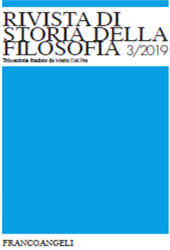Carl August Eschenmayer e la deduzione trascendentale della corporeità
453-472 p.
The Article focuses on the philosophical conception of Carl August Eschenmayer (1768-1852), who proposed a transcendental deduction of the human organism as a complement to Fichte's philosophy, at the same time stressing its fundamental a priori function for medical studies. The different stages of the deduction are reconstructed, starting from the two main faculties of reason, production and reflection, and passing through different moments: consciousness, intellect and categories, self-consciousness, and body. The analysis also intends to highlight some aspects which characterize Eschenmayer's original vision: the different perspectives adopted by the inquiry, the formation of polarities, the meaning of mathematical powers, and a conception of intersubjectivity which is fundamental not only for originating consciousness, but also for the transcendental understanding of the body. [Publisher's text]
-
Articles from the same issue (available individually)
-
Information
ISSN: 1972-5558
DISCIPLINES
KEYWORDS
- Eschenmayer, bodiliness, I, transcendental deduction, organism



